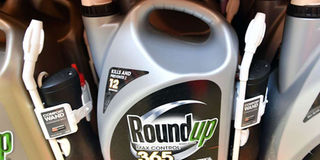To use or not? Dilemma over herbicide linked to cancer

Roundup, a weed killer, is one of the most common herbicides in Kenya. FILE | NATION
Farmers in Kenya use herbicides and pesticides to kill weeds and pests on their crops all the time with the hope to increase agricultural productivity.
Roundup, a weed killer, is one of the most common herbicides in Kenya. But glyphosate, the active ingredient in Roundup, has become a subject of heated debate globally among scientists, business people and governments.
The bone of contention is whether glyphosate causes cancer or not.
Last month, a study by researchers from the Route to Food Initiative, Biodiversity and Biosafety Association of Kenya, Kenya Organic Agriculture Network and Resources Oriented found 24 products in the country’s market classified as carcinogenic. This means they have the potential to cause cancer while a similar number of products were said to “cause damaging genetic changes” to people.
The International Agency for Research on Cancer of the WHO classifies glyphosate as probably carcinogenic. This was done after reviewing over 1,000 scientific studies on glyphosate. Most studies done on Roundup have linked it to a type of cancer called non-Hodgkin’s lymphoma, skin tumours and chronic lymphocytic leukaemia.
SPEED UP HARVEST
Currently, 12 countries, among them France, have banned glyphosate with Germany considering an embargo. In the US, where Roundup is widely used, several lawsuits have been filed against the manufacturer, Monsanto. To date, over 800 cases have been filed in the US courts by farmers who allege that glyphosate was the cause of their non-Hodgkin lymphoma.
But Dr Peter Mokaya, a health development practitioner from Organic Consumers Alliance of Kenya, says the use of Roundup in the country as a desiccant — a drying agent — by spraying on wheat and barley to speed up harvesting, has made it more toxic. “The idea is that it saves the farmer harvesting costs by reducing the natural drying period before harvest,” says Dr Mokaya explaining that this is one way in which the glyphosate residues enter the food and feed for animals later consumed as meat and milk.
Dr Mokaya is convinced there is enough scientific evidence of the harmful effects of glyphosate and its various formulations. While glyphosate is not the only risk factor, Dr Mokaya says it could have contributed to the increasing cases of cancer in the country.
CAUSE CANCER
But, the Agrochemicals Association of Kenya (AAK) says “on the basis of current scientific evidence, glyphosate-based products pose no undue health risks, including cancer, to the Kenyan public”.
Mr Joel Kimutai, Regulatory and Liaison manager of AAK, says the position of the association was reached after a meeting of experts from the Pest Control Products Board, University of Nairobi, National Commission for Science Technology and Innovation and scientists from Europe who have done research on glyphosate molecules. The meeting also assessed the risk assessment done by the Pest Control Products Board before licensing glyphosate in Kenya.
“There was no compelling data linking glyphosate to carcinogenicity,” Mr Kimutai tells HealthyNation in an exclusive interview.
But Dr Mokaya challenges AAK and partners to provide local evidence of misuse and recommend adoption of a precautionary approach.
Despite this review, ministries of Health and Agriculture are at loggerheads on glyphosate. Whereas Health Principal Secretary Susan Mochache recommends the removal of glyphosate herbicides from the market for having the potential to cause cancer and kidney failure, her Agriculture counterpart Prof Hamadi Boga says glyphosate is safe because it’s a herbicide.


